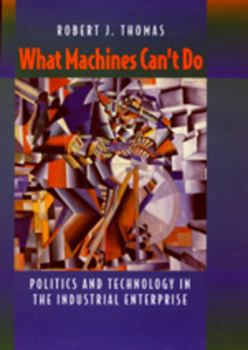What Machines Can't Do: Politics and Technology in the Industrial Enterprise
Virtually every manufacturing company has plans for an automated "factory of the future." But Robert J. Thomas argues that smart machines may not hold the key to an industrial renaissance. In this provocative and enlightening book, he takes us inside four successful manufacturing enterprises to reveal the social and political dynamics that are an integral part of new production technology. His interviews with nearly 300 individuals, from top corporate executives to engineers to workers and union representatives, give his study particular credibility and offer surprising insights into the organizational power struggles that determine the form and performance of new technologies.
Thomas urges managers not to put blind hopes into smarter machines but to find smarter ways to organize people. As U.S. companies battle for survival in an era of growing global competition, What Machines Can't Do is an invaluable treatise on the ways we organize work. While its call for change is likely to be controversial, it will also attract anyone who wishes to understand the full impact of new technology on jobs, organizations, and the future of the industrial enterprise.
Thomas urges managers not to put blind hopes into smarter machines but to find smarter ways to organize people. As U.S. companies battle for survival in an era of growing global competition, What Machines Can't Do is an invaluable treatise on the ways we organize work. While its call for change is likely to be controversial, it will also attract anyone who wishes to understand the full impact of new technology on jobs, organizations, and the future of the industrial enterprise.
Format:Paperback
Language:English
ISBN:0520087011
ISBN13:9780520087019
Release Date:March 1994
Publisher:University of California Press
Length:336 Pages
Weight:1.00 lbs.
Dimensions:0.7" x 6.4" x 9.0"
Related Subjects
Business & Investing Political Science Politics & Social Sciences Popular EconomicsCustomer Reviews
1 rating
Uncertainty is a Bonus: Technology Innovation
Published by Thriftbooks.com User , 24 years ago
Thomas provides provocative case studies on how major technology-intensive companies introduced new manufacturing machines and processes into their plants. Some readers may not like the idea that innovation means company politics, but this book shows how the very uncertainty of internal politics thwarted and aided the innovation process. By walking up to different views on what new technology was needed and what it would mean to a firm, many of the firms in his study gained new-found capacity to choose and manage technology. Large firms, whether product or process oriented, encompass many departments and professional work groups. His cases show how the efforts of engineers or unions or management to enact a vision of useful work in shapes innovation itself and, in my view, help us understand the complicated factors in seeking innovation. Another excellent feature of the book is the fact that he traces the entire innovation process--from how the original choices were framed and then selected to the learning associated with implementation. Some readers may be put off by the "theory" chapters, hence the four rather than five rating. Readers can easily skip the theory and methods and move to the cases. Those interested in what high quality qualitative social science can yield will find his work exemplary. Last but not least, my engineering undergrads read one of Thomas's cases and actually recommended I add the entire book the next time I taught the course. That's enthusiasm!






